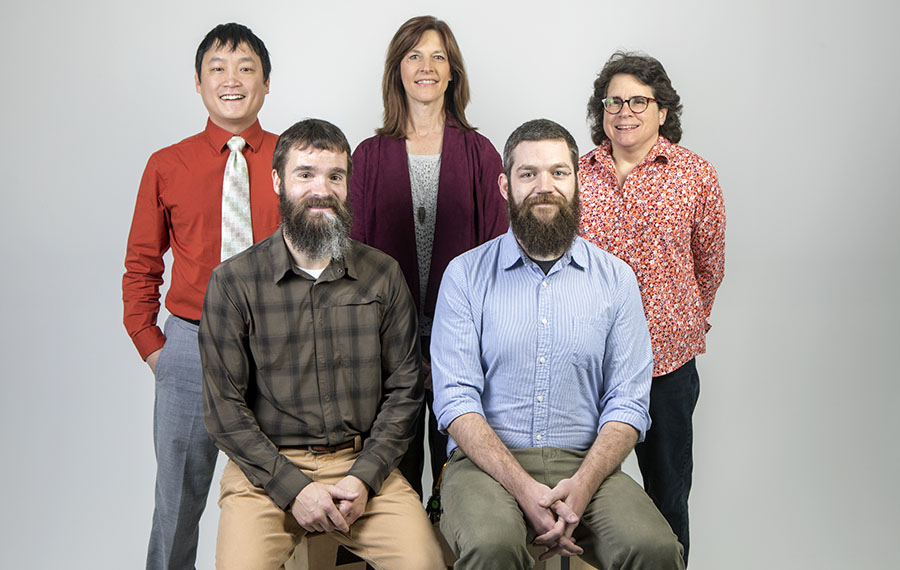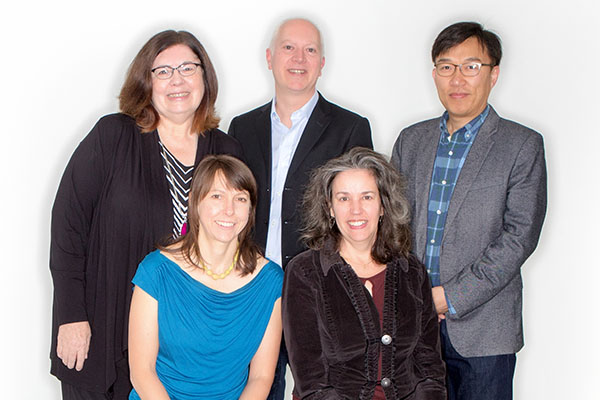BOONE, N.C. — Five Appalachian State University faculty members have been selected to receive the 2018 Appalachian Innovation Scholars Program (AISP) awards. Each grant provides up to $10,000 in funding and is supported by the Office of the Chancellor and Academic Affairs.
The projects vary in scope from research on renewable energy to wellness and social justice initiatives. “The winning proposals are developing innovative solutions to real-world problems, promoting regional economic development and improving the quality of life for the citizens of our region,” Chancellor Sheri Everts said. “They also foster community engagement and include research opportunities for students, faculty and staff with diverse talents and expertise. The outcomes will bring lasting value to our community and beyond.”
For the second consecutive year, the program recognizes faculty and staff for project proposals that exemplify one or more of the university’s strategic initiatives:
- sustainability in the areas of economics, equity and the environment;
- diversity;
- student research;
- global learning;
- wellness and safety; and
- community and civic engagement.
The winning proposals were selected from nine submitted by Appalachian faculty.
The 2018 winners are Dr. Richard Christiana, assistant professor in Appalachian’s Department of Health and Exercise Science and director of the university’s Healthy Outdoor Play and Exercise (HOPE) Lab; Dr. Beth Davison, director of Appalachian’s interdisciplinary studies program and co-director of University Documentary Film Services (UDFS); Kevin Gamble, lecturer in the university’s Department of Sustainable Technology and the Built Environment; Dr. Tammy Kowalczyk, professor in Appalachian’s Department of Accounting; and Dr. Nicholas Shaw, assistant professor in Appalachian’s Department of Chemistry.
The AISP was initiated to complement other innovation initiatives at the university, such as those offered through the Research Institute for Environment, Energy, and Economics (RIEEE), Office of Sustainability, Office of Research, AppLab, Integrative Design Experience Laboratory (IDEXlab), Transportation Insight Center for Entrepreneurship and others.
While some of the funded projects build on existing research, others are new initiatives. The awardees have up to two years to utilize the allocated funds.
Project summaries
Kowalczyk’s proposal for an applied learning initiative called “Impact Clinic” focuses on helping businesses assess the impacts of their operations across the “triple bottom line,” i.e., environmental stewardship, social equity and economic benefit.
Last fall, a pilot of the “Impact Clinic” was launched through the Assessing Sustainability in the Global Business Environment course offered in Appalachian’s Walker College of Business. Faculty members and students from several different disciplines, in collaboration with members of the local business community, worked in teams to provide impact assessments and improvement plans to the businesses.
“The purpose of the ‘Impact Clinic’ initiative,” Kowalczyk said, “is threefold: to provide experiential learning to students, to promote more sustainable practices and impacts among businesses and to provide an opportunity for academic engagement with community. This is facilitated by using a service-learning approach, where students engage with businesses to perform impact assessments using an Impact Assessment Tool from B Lab, a nonprofit organization that was established to help businesses assess and improve their impacts for the purpose of achieving a B certification.”
She said the primary societal benefit of the “Impact Clinic” will be sustainable development in the community through the growth of business practices that create more positive and responsible environmental, social and economic impacts.
According to Kowalczyk, these initiatives should allow for engagement across traditional academic boundaries and discipline silos so that students can appreciate the value of a multidisciplinary approach to sustainable development. “Students who participate in the clinic, and on projects fostered by it, gain experience in working in a multidisciplinary, service-learning environment, which develops professional skills needed to be effective change-makers after graduation,” she said.
Christiana’s project is an interdisciplinary collaboration between Appalachian’s Healthy Outdoor Play and Exercise (HOPE) Lab and Park Rx America, a leader in park prescription programs, to develop a regional outdoor recreation database that encourages outdoor physical activity for all ages. The database will offer descriptions, pictures and directions to aid physicians and other trained individuals in writing outdoor physical activity prescriptions for area residents to become aware of outdoor opportunities. Once an outdoor prescription is given, a person can then search the online database for a specific activity close to their home.
In order to develop, adapt and populate the Park Rx website, the HOPE Lab will use AISP funding to collect data on outdoor recreation resources from Western North Carolina — specifically in Watauga, Avery, Allegheny, Ashe, Caldwell and Wilkes counties — and provide support to its partnership with Park Rx America by adding amenities to the website that would allow an outdoor prescription program to be implemented and evaluated.
Christiana said developing this database is central to HOPE Lab’s success in facilitating outdoor physical activity prescription programs, as well as the goals of designing a Student Park Ambassador program at Appalachian in which trained Student Park Ambassadors will “prescribe” parks to their peers. He said the database will also help in obtaining grant funding for research on park and outdoor physical activity prescription programs for children in Western North Carolina, and help the Beaver College of Health Sciences and Appalachian in establishing a regional and national presence.
“Nationally, our innovation will provide recognition of Appalachian as a leader in rural health and promotion of recreation opportunities for physical activity. This partnership will facilitate research opportunities and encourage connections with medical professionals across the United States, expanding the literature on outdoor physical activity and potentially help to mitigate health concerns for our nation,” he said.
The interdisciplinary team for the project consists of Appalachian faculty from three disciplines and two departments: public health (Christiana, Department of Health and Exercise Science); recreation management (Dr. Joy James, associate professor in the Department of Recreation Management and Physical Education); and exercise science (Dr. Rebecca Battista, associate professor in the Department of Health and Exercise Science). Additionally, Appalachian students will be hired to assist with data collection.
Davison’s proposal involves establishing a minitheater in the information center at the National Park Service’s (NPS) Moses H. Cone Memorial Park for screening Appalachian video productions — educational videos about the park, the Blue Ridge Parkway and the surrounding area.
The park, which is located near Blowing Rock on the Blue Ridge Parkway, preserves the country estate of Moses H. Cone and draws over 70,000 tourists each year. NPS is reconfiguring the Flat Top Cone Manor, the 13,000-square-foot mansion built by Moses and Bertha Cone in 1901, to create a learning space for visitors.
“Interpretation of the Moses H. Cone Memorial Park through educational videos is truly an interdisciplinary approach. Information about larger historical context in which the estate was established requires an interdisciplinary enterprise — a matter of history, sociology, psychology and economics — to better understand all the influences that shaped the estate and the life of the estate workers,” Davison said.
The AISP funding will help build the theater, including purchasing audiovisual equipment and building materials. Students in Cameron Van Dyke’s Design Studio course are building furniture for the new minitheater. Van Dyke is a lecturer in Appalachian’s Department of Applied Design.
The minitheater is anticipated to be operational around March and will screen previous work from Appalachian, including Davison’s documentary project “The Denim Dynasty” — a film about the legacy of the Cone family and the Cone mill workers. The theater will start rotating and screening new productions as soon as they are completed, providing an ongoing exhibit space for future University Documentary Film Services (UDFS) productions.
Davison’s next documentary, “History of the Flat Top Manor and Cone Estate,” which builds on “The Denim Dynasty,” is being co-produced with Dr. Derek Davidson, senior lecturer in Appalachian’s Department of Theatre and Dance. The production, which is anticipated to be complete by fall 2018, will include interviews, theatrical readings of excerpts from oral histories and reenactments in period clothing (early 1900s). Students in Appalachian’s Department of Communication will assist UDFS staff in filming the production during the spring 2018 semester.
“Students who participate in these productions will have hands-on learning experiences and will additionally learn about the area’s history and culture, as well as its environmental issues,” she said. “Documentary work sends students out in the community to engage with community partners and have conversations with community members they normally do not encounter.”
Gamble’s proposal builds on his existing “Waste Not” project, which aims to promote local awareness of the local food loss and waste issue and to develop a regional food recovery and waste management program appropriate for the community. Gamble is working on the project with Hei-Young Kim, research assistant in the university’s Appalachian Energy Center.
In the first stage of the project, which was completed over spring and summer 2017, Gamble and his team conducted a preliminary survey of local food business’ practices related to food waste. The purpose of the study was to gain a better understanding of current food waste disposal practices at local food service businesses.
AISP funding will be used to launch a series of pilot studies, or phase two of the project. Gamble said, in this phase, he and his team will explore federal and state regulations related to food donation for human consumption and animal feed. The pilot studies will analyze and track food waste generation from participants to estimate any food waste reduction strategies and cost savings potential.
“Designing and evaluating these will require diverse expertise found at Appalachian and, therefore, provide many opportunities for interdisciplinary collaboration on a pressing environmental issue of global concern,” he said.
“By working closely with four local food service businesses, we can understand issues, concerns and the situation on-site. In addition, we will figure out any policy issues and/or benefits related to the top categories of the EPA’s food recovery hierarchy in order to develop an optimal strategy to implement those categories: source reduction, feeding people and feeding animals.”
Additionally, Gamble said the project will provide the data necessary for the university to explore a broader range of solutions as on-campus food waste collection exceeds the capacity of the existing composting facility.
The focus of Shaw’s project is developing a novel procedure for the synthesis of biodiesel fuel.
Shaw is working on the project with an interdisciplinary team of 22 Appalachian undergraduate research assistants who compose the Shaw Research Group. “I wouldn’t have received this award without their dedication and hard work,” he said.
According to Shaw, continued dependence on fossil fuels such as petroleum, coal and natural gas for energy production pose numerous and significant challenges, and “an alternative fuel must be technically feasible, economically competitive, environmentally acceptable and readily available.”
He said biodiesel is an alternative fuel that contains approximately 90 percent of the energy content of fossil-derived diesel and is apromising long-term replacement to petroleum-based diesel fuels.
Currently, the Shaw Research Group’s efforts are focused on two complementary objectives, he said. These include conducting pilot feasibility studies for commercial scale, swellable organically modified silica (SOMS) biodiesel production, and the laboratory scale synthesis of a diverse array of chemically different fatty acid esters.
“This procedure is tolerant to a diverse range of feedstock oils, it is incredibly efficient at producing biodiesel fuel at quantitative yields and subsequent purification is predictably simple,” Shaw said.
“We believe our work in SOMS synthesis of biodiesel provides an innovative approach to biodiesel that can potentially increase its contributions to the ever-increasing diversity of renewable energy.”
Proposals were due to the review committee — which is comprised of faculty and staff of Appalachian’s Innovation Campus Working Group — in November 2017. The selected projects met the general criteria set by the scholarship parameters. As outlined, project approaches and results might include, but are not limited to:
- research that leads to innovative thought within a discipline;
- the development of new classes;
- campus events that promote innovation;
- student engagement experiences that build community and support creative and data-based approaches to arrive at solutions;
- design initiatives that address a campus, community or societal challenge; and
- partnerships with town, county, state, national or international partners.
Members of the review committee were Dr. Nicole Bennett, RIEEE interim director; Dr. Mark Ginn, vice provost for undergraduate education; Dr. Chris Thaxton, assistant professor in the Department of Physics and Astronomy; Dr. Susan McCracken, director of career development and economic engagement; and Dr. Susan Mills, music education coordinator in the Hayes School of Music.
The funds for the AISP came from a one-time gift to the university and were awarded by the chancellor in support of innovative research and practice by faculty and staff throughout all disciplines and program areas on campus.
About the Chancellor’s Innovation Scholars Program
The Chancellor’s Innovation Scholars Program supports innovative research and practice by Appalachian State University faculty and staff throughout all disciplines and program areas on campus. These internal grants are awarded to Appalachian thought leaders who work creatively and entrepreneurially to address challenges; create lasting institutional change; provide community and societal benefits; establish opportunities that increase student engagement with research, creativity, innovation, design thinking and entrepreneurship; and promote broad-based sustainability in the areas of economics, equity and the environment. The program is intended to complement other innovation initiatives at the university. Learn more at https://www.appstate.edu/innovation-scholars.
About Appalachian State University
As a premier public institution, Appalachian State University prepares students to lead purposeful lives. App State is one of 17 campuses in the University of North Carolina System, with a national reputation for innovative teaching and opening access to a high-quality, cost-effective education. The university enrolls more than 21,000 students, has a low student-to-faculty ratio and offers more than 150 undergraduate and 80 graduate majors at its Boone and Hickory campuses and through App State Online. Learn more at https://www.appstate.edu.
What do you think?
Share your feedback on this story.















